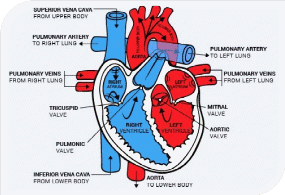
The circulatory system pumps blood via a network of arteries every time the heartbeats. These muscular, fluid tubes are responsible for transporting blood to the whole body. The superior vena cava and inferior blood veins transport oxygen-depleted blood from the left ventricle to the right atrium. Just the open tricuspid valve permits blood to reach the right ventricle in response to right atrial constriction. Whenever the ventricle is filled, the tricuspid valve shuts. As a result of this, blood cannot return to the right atrium during ventricular contractile contraction. A blood flow is created during the ventricle contraction, with blood passing via the pulmonic valve into the pulmonary artery and then into the body.
A network of pneumatic veins returns oxygen-rich blood to the heart, where the effector organs would utilize it. To carry oxygen-rich blood from the lungs towards the left atrium, the pulmonary veins must be open. A mitral valve that is open whenever the left atrium contracts force blood into the left ventricle, which is then closed whenever the left atrium contracts. After a full expansion of the ventricle, the mitral valve closes and prevents the formation of any more organs. When blood flows out from the heart and then into the aorta, it travels before reaching the rest of the body and receiving oxygen; this is known as the aortic valve (Togun et al., 2021).
The heart is a remarkable organ that keeps us alive by delivering oxygen and nutrients throughout our bodies. The circulatory system is a network of blood vessels through which blood is circulated as the heartbeats. The heart maintains constant blood flow across the body’s arteries, making the circulatory system an essential part of the body since it transports oxygen to all organs.
Reference
Togun, H., Hussain, A. A., Ahmed, S., & Shaker, H. (2021). Numerical study of blood flow through artificial heart valves. IOP Conference Series: Materials Science and Engineering, 1094(1), 012120.